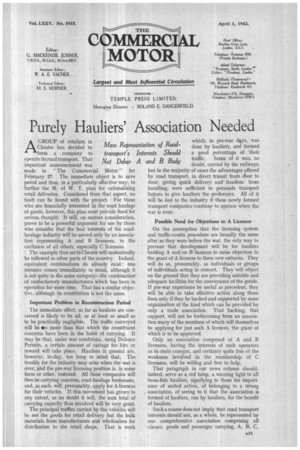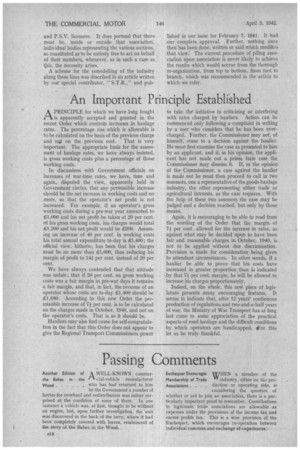Purely Hauliers' Association Needed
Page 15

Page 16

If you've noticed an error in this article please click here to report it so we can fix it.
AGROUP of retailers in Chester has decided to form a company to operate its road transport. That important announcement was made in "The Commercial Motor " for February 27. The immediate object is to save petrol and thus, in a particularly effective way, to further the M. of W. T. plan for rationalizing retail deliveries. Considered from that aspect, no fault can be found with the project. For those who are financially interested in the road haulage of goods, however, this plan must provide food for serious thought. It will, on mature consideration, prove to be a powerful argument for use by those who consider that the best interests of the roadhaulage industry will be served only by an association representing A and B licensees, to the exclusion of all others, especially C licensees.
The example thus set in Chester will undoubtedly be followed in other parts of the country. Indeed, equivalent combinations do already exist: one instance comes immediately to mind, although it is not quite in the same category—the combination of confectionery manufacturers which has been in operation for some time. That has a similar objective, although its constitution is not the same.
Important Problem in Reconstruction Period The immediate effect, so far as hauliers are concerned is likely to be nil, or at least so small as to be practically negligible. The traffic conveyed will be ea more than that which the constituent concerns have been in the habit of carrying. It may be that, under war conditions, using Defence Permits, a certain amount of cartage for hire or reward will take place. Hauliers in general are, however, to-day, too busy to mind that. The trouble for the industry may arise when the war is over, and the pre-war licensing position is, in some form or other, restored. All these companies will then be carrying concerns, road-haulage businesses, and, as such, will, presumably, apply for A licences for their vehicles. If this movement has grown to any extent, as no doubt it will, the sum total of carrying capacity thus involved will be very great.
The principal traffics carried by the vehicles will be not the goods for retail delivery but the bulk materials from manufacturers and wholesalers for distribution to the retail shops. That is work which, in pre-war days, was done by hauliers, and formed a good percentage of 'their traffic. Some of it was, no doubt, carried by the railways, but in the majority of cases the advantages 9ffered by road transport, in. direct transit from d'oor to door, giving quick delivery and freedom from handling, were sufficient to persuade transport buyers to give hauliers the preference. All of it will be lost to the industry if these newly formed transport companies continue to operate when the war is over.
Possible Need for Objections to A Licences On the assumption that the licensing system and traffic-courts procedure are broadly the same after as they were before the war, the only way to prevent that development will be for hauliers holding A and/or B licences to raise objection to the grant of A licences to these new entrants. They will do so, presumably, as individuals or groups of individuals acting in concert. They will object on the ground that they are providing suitable and adequate facilities for the conveyance of the goods. If pre-war experience be useful as precedent, they will be able to take effective action along those lines only if they be backed and supported by some organization of the kind which can be provided by only a trade association. That backing, that support, will not be forthcoming from an association many of the members of which will themselves be applying for just such A licences, the grant of which is to be approved.
Only an association composed of A and B licensees, having the interests of such operators as its main concern, and certainly quite free of the weakness involved in the membership of C licensees, will be willing and free to help.
That paragraph in our news column should, indeed, serve as a red lamp, a warning light to all bona-fide hauliers, signifying to them the importance of united action, of belonging to a strong . association, of seeing to it that the association is formed of hauliers, run by hauliers, for the benefit of hauliers.
Such a course does not imply that road transport interests should not, as a whole, be represented by one comprehensive association comprising all classes, goods and passenger carrying, A, B, C, and P.S.V. licensees. It does portend that there must be, inside or outside that association, individual bodies representing the various sections, so constituted as to be entirely free to act on behalf of their members, whenever, as in such a case as this, the necessity arises.
A scheme for the remodelling of the industry along those lines was described in an article written by our special contributor, " S.T.R.," and pub lished in our issue for February 7, 1941. It had our complete approval. Further, nothing since then has been done, written or said which modifies that view. The current procedure of piling association upon association is never likely to achieve the results which would accrue from the thorough re-organization, from top to bottom, from root to branch, which was recommended in the article to which we refer.




















































